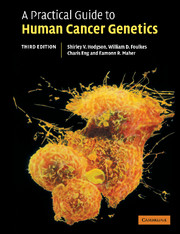Book contents
- Frontmatter
- Contents
- Dedication
- Preface
- Acknowledgements
- Part one Cancer genetic counselling
- Part two Genetics of human cancers by site of origin
- 2 Central nervous system
- 3 Eye
- 4 Cardiorespiratory system and thorax
- 5 Endocrine system
- 6 Gastrointestinal system
- 7 Reproductive system
- 8 Urinary system
- 9 Blood and lymph
- 10 Musculoskeletal system
- 11 Skin
- Part three Cancer-predisposing syndromes
- Appendix
- References
- Index
6 - Gastrointestinal system
Published online by Cambridge University Press: 20 August 2009
- Frontmatter
- Contents
- Dedication
- Preface
- Acknowledgements
- Part one Cancer genetic counselling
- Part two Genetics of human cancers by site of origin
- 2 Central nervous system
- 3 Eye
- 4 Cardiorespiratory system and thorax
- 5 Endocrine system
- 6 Gastrointestinal system
- 7 Reproductive system
- 8 Urinary system
- 9 Blood and lymph
- 10 Musculoskeletal system
- 11 Skin
- Part three Cancer-predisposing syndromes
- Appendix
- References
- Index
Summary
Tumours of the gastrointestinal system are among the most common tumours in humans, and although environmental influences have been clearly implicated, heredity is recognised as being of major importance in their aetiology.
Oesophageal tumours
The incidence of squamous cell carcinoma of the oesophagus shows marked geographical variation, with a high frequency in the Caspian littoral of Iran, certain parts of the interior of China and the Transkei region of South Africa, and a low incidence in European and North American whites. Oropharyngeal tumours are also commoner in areas with a high incidence of oesophageal cancer. These findings are thought to be the result of differences in exposure to ingested carcinogens rather than of major genetic factors, although the at-risk individuals who develop this cancer in these high-risk areas are predominantly of Mongol or Turkic origin. The incidence of oesophageal cancer in the UK is 6 per 100 000, and it is commoner in males. Almost all (98 per cent) of oesophageal cancers are squamous carcinomas.
Early studies suggested that genetic factors do not play a major role in most cases of oesophageal cancer as there did not appear to be an increased risk to relatives of index cases (Mosbech and Videbaek, 1955), and recent studies in the United States have been in agreement (Dhillon et al., 2001).
- Type
- Chapter
- Information
- A Practical Guide to Human Cancer Genetics , pp. 42 - 66Publisher: Cambridge University PressPrint publication year: 2006



